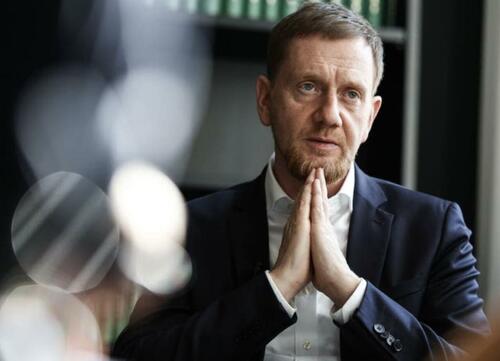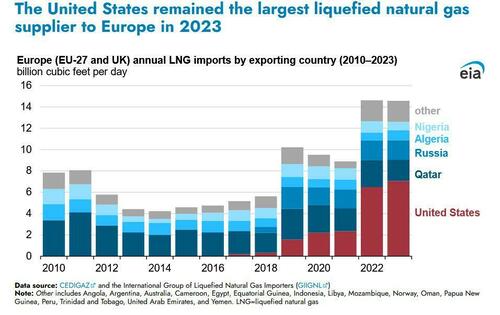Top German Politicians Are Calling For Resumption Of Russian Gas
In Europe, the lure of a return to cheap energy is ever-present, and that conversation is becoming easier as the Trump administration in Washington pushes hard for ceasefire negotiations with Moscow.
Senior German politicians are already calling for a resumption of ties with Russia. For example Michael Kretschmer, a senior member of Friedrich Merz’s centre-right Christian Democrats, is now arguing that EU sanctions on Russia are "completely out of date" as they increasingly openly contradict "what the Americans are doing."

Financial Times in a fresh report quoted Kretschmer's words to the German press agency DPA as follows: "When you realize that you’re weakening yourself more than your opponent, then you have to think about whether all of this is right."
The same publication has observed the expected immediate backlash to the statements as follows:
Kretschmer, who is also a long-standing opponent of weapons deliveries to Ukraine, is the latest in a string of figures from both Merz’s centre-right CDU and the centre-left Social Democrats to have gone public in recent weeks with calls to resume economic or energy ties with Russia.
That has created a problem for Merz — who is all but certain to be Germany’s next chancellor — as well as for his likely coalition partners in the SPD at a time when he is trying to cast himself as a strong partner for Ukraine and for Europe. Germany’s Green party, which is strongly pro-Kyiv, called on Sunday for Merz to clamp down on “friends of Putin” in his party.
But Merz hasn't himself actively tried to silence this growing desire in some political circles for rapprochement with Russia.
But Bloomberg reported Monday, "The co-head of Germany’s Social Democrats party and frontrunner to become the next finance minister Lars Klingbeil dismissed swirling speculation over reviving pipeline gas deliveries from Russia after a potential peace deal for Ukraine."
And as we highlighted, TotalEnergies’ chief executive Patrick Pouyanne said last week:
“I would not be surprised if two out of the four (came) back to stream, not four out of the four,” Patrick Pouyanne said at an industry event in Germany’s capital city, Berlin, as carried by Reuters.
“There is no way to be competitive against Russian gas with LNG coming from wherever it is,” the executive added.
Meanwhile, both Hungary and Slovakia not only continue bypassing Ukraine for imports of Russian gas - after Ukraine broke from the transit of Russian gas on January 1st - but are actually boosting these supplies.
Hungarian Foreign Minister Peter Szijjarto announced on Tuesday that the Veľké Zlievce/Balassagyarmat interconnection border point from Hungary to Slovakia has been brought to full capacity due to the stoppage through Ukraine.

"We managed to solve the problem of natural gas supplies to Slovakia and Hungary, despite the fact that Ukraine created very serious difficulties for us. To ensure reliable gas supplies to Slovakia via Hungary even with the cessation of its transit through Ukraine, we had to increase the capacity of the connecting gas pipeline between our countries," the FM told a press briefing.
"Today, the gas pipeline between Hungary and Slovakia is operating at increased capacity. We have now increased the capacity of this pipeline by 900 million cubic meters per year. Until now, 2.6 billion cubic meters were transported between the two countries per year. Starting today, this volume will increase to 3.5 billion cubic meters," Szijjarto noted.
He added that "compared to last year's record volume, the volume of natural gas transported through Hungary to Slovakia has increased by 50% in the first three months of this year."


